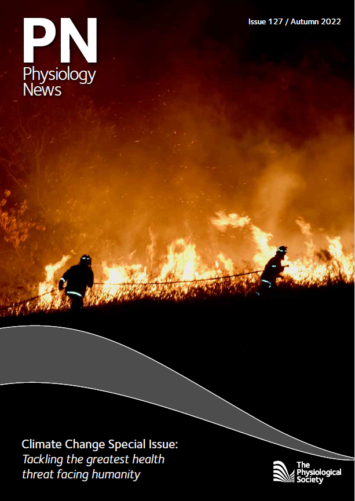
Physiology News Magazine
Environmental Impacts on Pregnancy and Offspring Outcomes: Lessons Learned and Avenues for Intervention
Meeting Preview
Events
Environmental Impacts on Pregnancy and Offspring Outcomes: Lessons Learned and Avenues for Intervention
Meeting Preview
Events
https://doi.org/10.36866/pn.127.38
Professor Peter Nathanielsz
University of Wyoming, US
Thursday 29 September 2022, London, UK

This one-day Physiological Society meeting organised by Dr Amanda Sferruzzi-Perri and Dr Emilio Herrera is extremely timely. The concept of the fetal origins of adult disease emerged in the last decade of the last century. Its central tenet is that challenges to the fetus such as undernutrition and overnutrition at plastic periods of fetal development result in changes in the organism’s developmental trajectory.
The outcomes of these challenges change the organism’s phenotype, altering its predisposition to chronic conditions such as diabetes, cardiovascular disease, endocrine and neurological function, and other physiological systems that impair life-course health. The scope of this concept, sometimes called developmental programming, or the Barker hypothesis after David Barker who led the charge against the conventional wisdom at that time, and still present in some areas of biomedical research. It is the sole importance of our genetic endowment at fertilisation on lifecourse function.
This field of research has now grown to encompass the plastic periods of neonatal, in addition to fetal, life and is now referred to as the developmental origin of health and disease. To show the widespread acceptance of these concepts, there is now an International Society for the Developmental Origins of Health and Disease that will meet in August in Vancouver. Several of the invited speakers at The Physiological Society meeting are also speaking in Vancouver so The Society’s September meeting will be completely up to date.
Research over the last 10 years has shown that development of each unique physiological phenotype depends as much on epigenetic as genetic mechanisms. The eight invited speakers have contributed substantially to knowledge of both mechanisms and outcomes of programming. The London meeting will be an opportunity to review the most recent advances.
Physiological science has been a leader in building firm, evidence-based knowledge in this area. The titles of the meeting’s talks cross many boundaries: neurocardiovascular, metabolism, inflammation, diet and obesity and oxidative function.
This is an exciting area for those interested in careers in physiology. Knowing all the speakers as I do, this is a glorious opportunity to listen to thought-provoking new ideas from world leaders, getting help with presenting your own ideas and who knows, perhaps an opportunity to find a mentor of a laboratory where you could join in this fascinating research in the next phase of your career. Registration is open until 15 September, please visit: physoc.org/pregnancyoutcomes Don’t miss this meeting.
